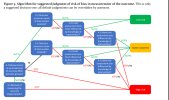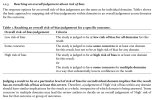Dolphin
Senior Member (Voting Rights)
Now published, see post #5
-----------------
https://journals.sagepub.com/doi/pdf/10.1177/ANPA_59_1S
RANZCP Abstract Book, 2025
COGNITIVE BEHAVIOURAL THERAPY FOR THE TREATMENT OF CHRONIC FATIGUE SYNDROME IN ADULTS – A META-ANALYSIS
V Kolala1, B La Rosa2, V Vangaveti3, K Chen4
1Canberra Health Services, Canberra, Australia 2Serco, Townsville, Australia
3Research Division, James Cook University, Townsville, Australia 4Queensland Health, Townsville, Australia
Background: The efficacy of cognitive behavioural therapy (CBT) for the treatment of chronic fatigue syndrome (CFS) remains controversial.
Objectives: The purpose of this meta-analysis was to understand the short-term and long-term efficacy of CBT on different outcome measures on patients with CFS, as well as explore its potential adverse effects. The primary outcome was change in level of fatigue, with secondary outcomes being physical functioning, pain, quality of life, anxiety and depression.
Methods: The authors conducted a meta-analysis in accordance with PRISMA guidelines to include randomised controlled trials (RCT) on the efficacy of CBT for adults with CFS. Findings: 12 studies were included in this review. Individual face to face CBT was found to have a large effect size in reducing fatigue (Cohen’s d = 2.91, 95% CI 0.51 to 5.31, p=0.02). Self-directed CBT was found to have a large effect size in improving physical functioning (Cohen’s d = –2.76, 95% CI –5.06 to –0.47, p = 0.04). No serious adverse effects were reported.
Conclusions: CBT as a treatment modality inherently leads to difficulties with blinding and bias. The results suggest that patients with milder disease may benefit more from self-directed CBT. It is unclear why individual face to face CBT and self-directed CBT were only efficacious for fatigue and physical functioning respectively, but not both outcomes. Current guidelines have mixed recommendations with CBT as treatment, however we suggest CBT be offered to all patients with CFS.
Conflicts of interest Nil conflict of interests to report.
-----------------
https://journals.sagepub.com/doi/pdf/10.1177/ANPA_59_1S
RANZCP Abstract Book, 2025
COGNITIVE BEHAVIOURAL THERAPY FOR THE TREATMENT OF CHRONIC FATIGUE SYNDROME IN ADULTS – A META-ANALYSIS
V Kolala1, B La Rosa2, V Vangaveti3, K Chen4
1Canberra Health Services, Canberra, Australia 2Serco, Townsville, Australia
3Research Division, James Cook University, Townsville, Australia 4Queensland Health, Townsville, Australia
Background: The efficacy of cognitive behavioural therapy (CBT) for the treatment of chronic fatigue syndrome (CFS) remains controversial.
Objectives: The purpose of this meta-analysis was to understand the short-term and long-term efficacy of CBT on different outcome measures on patients with CFS, as well as explore its potential adverse effects. The primary outcome was change in level of fatigue, with secondary outcomes being physical functioning, pain, quality of life, anxiety and depression.
Methods: The authors conducted a meta-analysis in accordance with PRISMA guidelines to include randomised controlled trials (RCT) on the efficacy of CBT for adults with CFS. Findings: 12 studies were included in this review. Individual face to face CBT was found to have a large effect size in reducing fatigue (Cohen’s d = 2.91, 95% CI 0.51 to 5.31, p=0.02). Self-directed CBT was found to have a large effect size in improving physical functioning (Cohen’s d = –2.76, 95% CI –5.06 to –0.47, p = 0.04). No serious adverse effects were reported.
Conclusions: CBT as a treatment modality inherently leads to difficulties with blinding and bias. The results suggest that patients with milder disease may benefit more from self-directed CBT. It is unclear why individual face to face CBT and self-directed CBT were only efficacious for fatigue and physical functioning respectively, but not both outcomes. Current guidelines have mixed recommendations with CBT as treatment, however we suggest CBT be offered to all patients with CFS.
Conflicts of interest Nil conflict of interests to report.
Last edited by a moderator:

 Vivek Kolala
Vivek Kolala

